Mar 04 (newsonjapan.com) - For many years now, Japan has been the 3rd largest economy in the world, with a GDP of over 4.872 trillion back in 2017.
Since then, it is estimated the GDP has increased by another trillion. Besides being amongst the countries with the largest economy in the world, Japan is also known as the world's largest creditor, which has turned the Japanese yen into one of the most important currencies in the world.
For decades now, the Japanese yen has been considered the proxy for Asia. If you watch the news, you will soon start to see that, anytime something of political or economic importance happens in Asia, investors will start discussing their opinions in relation to the Japanese yen, even though the problems are not happening in Japan.
Many investors consider the Japanese yen an investment safe haven, which quickly turned it into the 3rd most traded currency in the forex market, after the U.S. dollar and euro. But that is not the only reason the Japanese yen makes for such an important investment. A number of economic decisions have made the currency extremely sought after, not only in the foreign exchange market but in other types of investments as well. Below we will be discussing the most important reasons you should consider Japanese yen for your next investments.
Japan's zero rate interest
When Japan first introduced the zero interest rate policy, many viewed it poorly, and critics still argue it has not done much to stimulate the local economy, but now, a number of other countries are starting to consider it as well.
The Bank of Japan introduced the zero interest rate policy 21 years ago and was perceived at the time as a very unusual strategy for Japan. That, until 2008, when the financial market conflagration forced both the European Central Bank and the U.S. Federal Reserve to consider similar methods.
Even though zero interest rates may not be the best policy to boost inflation, many other European countries are now experimenting with it to encourage individuals to borrow and invest money.
A popular currency to fund businesses
The country's zero interest rates made the Japanese yen an extremely popular funding currency for many. It costs extremely little to borrow yens, which makes it an attractive tool to fund currency purchases, with many believing it played an important role 12 years ago, during the recession.
As other countries are beginning to follow in Japan's footsteps, experts are predicting a new wave of investments that are funded with low yield currencies.
Because the yen is such a popular funding currency, uncertainty in other financial markets tend to drive the yen higher against currencies such as the U.S. dollar or euro. This is why, during a market crash, people can expect the yen to rise quite fast. This is why the Japanese yen can be used to measure the market's risk tolerance as well.
How to invest in the Japanese yen
More than a decade ago it became a very popular practice amongst investors to borrow Japanese yens from the Bank of Japan, then further lend the money in currencies such as euros or U.S. dollars at much higher interest rates. This hurt the export sector quite considerably, until 2013 when Prime Minister Shinzo Abe was elected and managed to bring down the yen's valuation.
Now, the situation is a bit more different and investors are looking for long-term ways to invest in yens. If you are wondering how you can invest in the Japanese yen, here are some options to consider:
The forex market
The forex market is the largest financial market in the world, with over $5 trillion traded daily. 80% of that amount is accounted for by just 7 major currencies, and the Japanese yen is one of them. The number of forex brokers based in Japan is increasing, but so is the number of retail traders. This happens because experienced traders are looking to increase profits by buying currencies with high leverage.
The Japanese yen is mostly traded against the U.S. dollar, making the USD/JPY, making it the second most traded currency pair in 2019, after the EUR/USD. In total, it accounted for 13.2% of daily transactions last year.
Exchange-traded funds (ETFs)
This is considered one of the easiest ways to invest in the Japanese yen, especially if you are an international investor. ETFs attempt to mirror the price of the Japanese yen against the U.S. dollar or any other currency, which makes it easier for investors to plan their next moves.
Some funds also provide options for investors to capitalize on the currency's movements in a number of ways. Even though there are a number of Japanese ETFs investors can consider, the ProShares UltraShort Yen (YCS) and CurrencyShares Japanese Yen Trust (FXY) are the most popular ones, reaching, together, over $640 in total assets.
Stocks and Bonds
Another way to invest in the yen, but without actually owning currency, is by buying Japanese-owned companies' stocks or bonds. The yen often appreciates against the U.S. dollar, boosting stock prices. Companies such as Mitsubishi, Toyota, Nissan, and Matsushita are the ones investors prefer most. If you are considering debt instruments, Japanese government bonds are another option, as their prices usually reflect the current state of the country's economy.
Futures
Futures have a set expiration and a fixed strike price, which allows you to speculate on the yen's activity. But yen futures do have a considerable degree of leverage, meaning you can often be at risk for significant losses. The best way to do this is by working with a professional who has learned the market and can help you make a profit.
Ideally, if you are a trained investor, you can use the potential leverage to buy and sell options on yen futures contracts to make profits fast. But this involves knowing the market very well and being able to speculate on prices.









